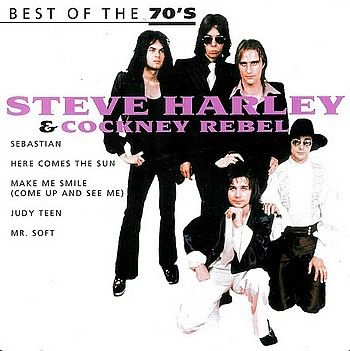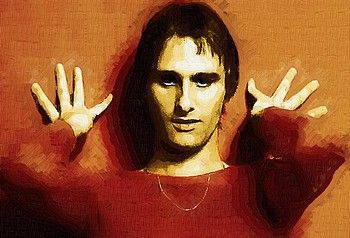
Steve Harley & Cockney Rebel - Best Of The 70's - 2000 - Disky
A few bands and artists were caught up in the notorious "Glam Rock" net in Britain in the mid seventies. Many of these bands were overnight sensations, or one hit wonders, and many were studio manufactured. Some of these bands were also hugely successful, due to clever management and recording songs written by top class songwriters. It is well known that many of these artists couldn't play, or sing, (the perfect recipe for success in the glitzy seventies!). However, some of these artists had predated the "Glam Rock" era, and were hugely talented. Just to name a few - T.Rex, David Bowie, Mott The Hoople, Abba, Elton John, Roy Wood & Wizzard, and Roxy Music. All these artists could sing, play, write brilliant songs, and they would have made the grade regardless of the ridiculous studio trickery that went into other "Glam Rock" bands that eventually fell by the wayside..... "You can fool some of the people, etc, etc....". Anyway, Steve Harley & Cockney Rebel were one of THE great "Glam Rock" bands. Steve Harley was a superb songwriter, singer, and showman. His songs include "Make Me Smile", "Judy Teen", "Mr. Raffles", "Mr. Soft", "The Best Years Of Our Lives", and "Psychomodo". These are all intelligent, well written songs, with great hooks, and Cockney Rebel had a very individual musical style. Without a doubt, one of the most talented bands to emerge in the seventies. "Best Of The 70's" is a great compilation of SH & CR's songs. Quite a few are missing, but if you listen to CR's brilliant "The Psychomodo", and "The Human Menagerie" albums , and Steve Harley's "Poetic Justice" album, you will have gone some distance towards hearing the band's best work
TRACKS
Make Me Smile (Come Up And See Me)
(Love) Compared To You
Judy Teen
Mr. Raffles (Man It Was Mean)
Mr. Soft
Sebastian
That's My Life In Your Hands
Here Comes The Sun
All Men Are Hungry
Roll The Dice
The Best Years Of Our Lives
Star For A Week (Dino)
Rain In Venice
The Last Time I Saw You
Psychomodo
Irresistible [Remix]
All songs composed by Steve Harley, except "That's My Life In Your Hands" by Steve Harley/Hugh Nicholson, "Roll The Dice" by Steve Harley/Partridge, and "Here Comes The Sun" by George Harrison
MUSICIANS
Steve Harley - Guitar, Vocals - 1972 - present
John Crocker - violin / mandolin / guitar - 1972 - 74
Jim Cregan - guitarist - 1975 - 77
Paul Jeffreys R.I.P - bass - 1973 - 74
George Ford - bassist - 1975 - 77
Milton Reame-James - keyboards - 1973 - 74
Duncan MacKay - keyboards - 1975 - 77
Stuart Elliot - drums - 1973 - 77, 2006
ORIGINAL BAND
Steve Harley - Guitar, Vocals
John Crocker - (Fiddle / Mandolin / Guitar)
Paul Jeffreys R.I.P - Bass
Milton Reame-James - Keyboards
Stuart Elliott - Drums
BIO
British rocker Steve Harley was born Steven Nice in London on February 27, 1951; the son of a jazz singer, he was stricken with polio at age two and spent the better part of his adolescence in and out of hospitals. After trying his hand at journalism, by the early '70s Harley was busking throughout London, forming the band Cockney Rebel in 1973 with guitarist Jean Paul Crocker, bassist Paul Jeffreys, keyboardist Milton Reame James, and drummer Stuart Elliott. Signing to EMI, the group debuted with The Human Menagerie; the single "Judy Teen" followed in early in 1974, becoming Cockney Rebel's first hit. Psychomodo was also a success, but as Harley's combative relationship with the press worsened he dissolved the group soon after. A Harley solo single, "Big Big Deal, " preceded the formation of a new Cockney Rebel lineup, which again featured drummer Stuart Elliott in addition to new guitarist Jim Cregan, bassist George Ford and keyboardist Duncan McKay. 1975's The Best Years of Our Lives generated Harley's first U.K. chart-topper, "Make Me Smile (Come Up and See Me), " on its way to selling over a million copies; the follow-up Love's a Prima Donna also launched a Top Ten hit with its cover of the Beatles' "Here Comes the Sun." But in the wake of 1977's Face to Face -- A Live Recording, Harley again disbanded Cockney Rebel and relocated to the U.S., recording the better part of Hobo With a Grin in Los Angeles before returning to Britain. 1979's The Candidate failed to restore his commercial lustre, and with the exception of a minor 1983 hit "Ballerina (Prima Donna)" he spent the better part of the '80s removed from the pop scene. When his recording of "Mr. Soft" experienced a rebirth thanks to its use in a television commercial, Harley assembled a hits collection of the same name. Soon after he formed a new incarnation of Cockney Rebel and regularly toured into the following decade. 1999's Stripped to Bare Bones documents an acoustic set recorded the year previous. Yes You Can was issued in summer 2000. © Jason Ankeny, All Music Guide

MORE ABOUT STEVE HARLEY & COCKNEY REBEL (WIKIPEDIA)
Steve Harley (born Stephen Malcolm Ronald Nice, 27 February 1951,Deptford, London, England) is a English singer and songwriter, best known for his work with the 1970s rock group Cockney Rebel, with whom he still occasionally tours (albeit with many personnel changes through the years). As a child, Harley suffered from polio, spending four years in hospital up to the age of 16. It was in hospital that he first heard Bob Dylan, inspiring him to a career of words and music. At the age of 10, he received a guitar from his parents, and he played violin with the school orchestra. He left the Haberdashers' Aske's Hatcham College with no O levels. In 1968, at the age of 17, Harley began work as an accountant with the Daily Express, from which he progressed to become a reporter in a number of local Essex newspapers for a duration of three years. Later, he returned to London to work for the East London Advertiser. Harley first started out playing in bars and clubs in the early 1970s, mainly at folk venues on open-mike nights. He also busked around London on the Underground and in Portobello Road. While auditioning for folk band Odin in 1971, he met violinist John Crocker, with whom he formed Cockney Rebel in late 1972. Cockney Rebel went on to release The Human Menagerie and The Psychomodo before splitting up in 1974. However, Harley carried on with drummer Stuart Elliot, renaming the band Steve Harley & Cockney Rebel, with whom he had more success. From the next album, The Best Years of Our Lives, came the number one and million selling single, "Make Me Smile (Come Up and See Me)". Harley had two more hits during the mid 1970s with "Mr Raffles" and "Here Comes the Sun" which were both Top 20 hits, but he did not have any further major successes, and in the 1980s he all but faded from the public eye, relocating to the United States. He was set to star as the Phantom in the London premiere of The Phantom of the Opera, and recorded the promotional single of the title song, but was surprised to be replaced close to rehearsals by Michael Crawford. In the early 1990s, Harley released several solo albums. His songs "Sebastian", "Tumbling Down", and "Make Me Smile (Come Up and See Me)" were included in the Todd Haynes 1998 rock musical Velvet Goldmine. The soundtrack album included "Make Me Smile", but omitted "Sebastian", yet included a cover version of "Tumbling Down" with vocals by Jonathan Rhys Myers. "Make Me Smile" was also included in the 1997 film, The Full Monty. In 1999, Harley began presenting a BBC Radio programme The Sounds of the Seventies, of which the last programme aired on 27 March 2008. In 2005, The Quality of Mercy was released under the Steve Harley & Cockney Rebel name, and Harley began touring more frequently, although mainstream success remained elusive. Harley lives in Suffolk with his wife, Dorothy. They have two children, Kerr and Greta
CHECK OUT THE DETAILED HISTORY OF STEVE HARLEY & COCKNEY REBEL @ SHARL/COCREB





1 comment:
LINK
p/w aoofc
Post a Comment